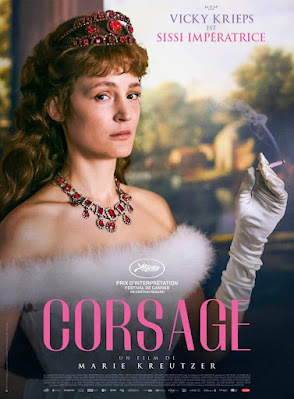‘CORSAGE’ was shown in Trinoma recently without any fanfare, so it’s not surprising no one really watched it.
It’s about Empress Elisabeth of Austria, nicknamed Sissi.
She was married to Emperor Franz Joseph in 1854 at the age of 16 and was assassinated on September 10, 1898.
We first heard of her when we saw the movie “Forever My Love” in 1962, starring German actress Romy Schneider in her breakout role as Sissi, with Karl Boehm as Franz.
It was a big hit and was shown in Manila for several weeks, with viewers gushing over the sweet romantic love story of a real life princess.
This opened the doors for Romy to an international career.
She did “Christine” with Alain Delon and fell in love with him.
Later on, she did films in Hollywood like “Good Neighbor Sam” with Jack Lemmon and “What’s New Pussycat” with Woody Allen.
“Corsage” shows an entirely different version of the Empress Sissi.
It’s 1877 and she is now 40 years old, lonely and bored. She used to be idolized for her beauty and being a fashion plate.
She knows her looks is at the mercy of a populace who is always watching out how much she weighs.
But she is now tired of maintaining her public image and she is getting more restless. With her husband being unfaithful to her, she feels rebellious.
She travels abroad, seeking excitement and reliving her youth. She brazenly flirts with a riding instructor, but he rejects her advances.
Corsage usually means a bunch of flowers pinned on a woman’s gown.
But in German, it means the upper half of a woman clothes and here, we are shown that Sissi has to maintain her slim figure by torturing her upper body in tighter and tighter corsets that her ladies in waiting help her with as she struggles to put them on.
It’s easy to see that the movie also has feminist overtones about the tough expectations on women. Corsets are like straightjackets that women put on for them to stay sexy and seductive.
It infers that Sissi had the same plight as Princess Diana as the lonely member of a royal family.
The movie has sumptuous production values. The sets and costumes are quite impressive. It’s just too bad that it’s quite a cumbersome watch as the storytelling is trudging and often bogs down.
What holds it all together is the spectacular portrayal of Vicky Krieps who we started admiring since we saw her as Daniel Day Lewis’ mysterious wife in “Phantom Thread”.
As the Empress who is so different here from the way she’s portrayed in the Romy Schneider films, Vicky’s Sissi is desperately gasping for breath, depressed and often brooding, weeping, smoking, using heroine, making suicide attempts like when she suddenly jumps out of a window.
She has even mastered pretending how to faint convincingly just to extricate herself out of her public obligations. She’s manifestly going through an existential crisis.
At one point, she declares: “Nobody loves nobody. Everybody loves what he wants from others. And we love anybody who loves in us that which we would like to be.”
The movie’s Austrian director, Marie Kreutzer, apparently has no intentions of coming up with an authentic and truthful interpretation of Sissi’s life.
The real Sissi was assassinated by an Italian anarchist in 1898 while she was in Switzerland. In the movie, she was given a totally different kind of ending.
Maybe it’s Kreutzer’s meditation on the tragedy brought about by bitter melancholy and depression.
This is probably her way of liberating Sissi from history that shackled her, giving her the freedom to do what she wants to do in her life, which she never had as she is limited by her royal duties as a noblewoman.





.jpg)


